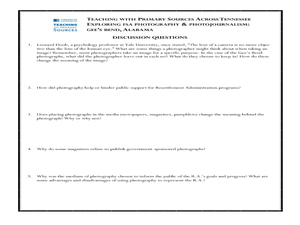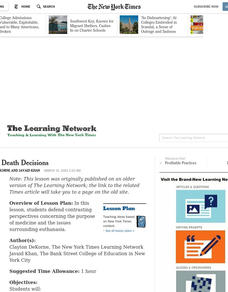Curated OER
Teaching with Primary Sources Across Tennessee
Students examine Gee's Bend Alabama. In this resettlement lesson plan, students view a series of photographs taken of Gee's Bend Alabama. Students will write a series of newspaper articles based on the images, that exemplify the...
Curated OER
The Lorax Explorations
Middle schoolers read and debate the purpose of Dr. Seuss' The Lorax, analyze its story elements, and write their own The Lorax II.
Curated OER
The Rumpelstiltskin Story
Why didn't Rapunzel's hair stop growing? Why did it take the fairy godmother so long to intervene in Cinderella's affairs? Young writers consider unanswered questions like these and compose news articles investigating the true story...
Curated OER
Rediscovering Forgotten Women Writers
Women's voices are becoming more prominent in the world of literature, but for centuries, this wasn't the case. Young historians research a woman whose writings are considered to be lost, out of print, or forgotten. They develop an oral...
Curated OER
The Facts, Gimme the Facts!
Learners engage in a variety of activities which help them memorize their times tables. There are some very good ideas imbedded in this plan of how to systematically teach the basic facts in a way that help students retain what they learn.
Curated OER
As the Kids Come and Go: Mapping a Classroom
Map the classroom with your kids to help them understand how maps work and how to read them. The lesson starts off with a story about animals living and moving around the globe, and then kids create maps of their classroom to show how...
Curated OER
Hypatia: Angles
Introduce your young geometers to Hypatia, the first noted Greek female mathematician, and the properties of angles. Though this resource is missing worksheets that are needed to complete the lesson, the structure is sound and learning...
Curated OER
Autobiography
Sixth graders read and write autobiographical sketches, determine the author's purpose in writing, and type paragraphs using WP utilities.
Curated OER
For the Fun of It
Middle schoolers investigate author's purpose in autobiography by reading Amelia Earhart's autobiography entitled The Fun of It. Young scholars examine character traits needed to fulfill personal goals.
Curated OER
Using Children's Literature to Teach Writing: No, David!
Students review beginning, middle, and end of a story and how details add to a story.
Curated OER
Teaching Elementary School Social Studies
Students identify possible social studies themes that can come from the video, "Voyage of Discovery". They list the five themes of geography. They develop elementary-level interdisciplinary unit plans for social study content. They...
National Endowment for the Humanities
The Poet's Voice: Langston Hughes and You
Middle schoolers complete a unit of lessons that explore the poetic voice of Langston Hughes. They define voice, read and analyze various poems by Langston Hughes, and complete journal entries for each instructional activity.
Curated OER
KWHL Jacob Have I Loved
Your class has just begun reading Jacob Have I Loved, and they're coming upon the fifth chapter. Pause their reading and have them complete a KWHL chart (not included) to detail what they've learned from the novel's beginning. An example...
Mascil Project
Sports Physiology and Statistics
If I want to build up my heart, where should I start? Science scholars use statistics in a sports physiology setting during an insightful experiment. Groups measure resting and active heart rates and develop a scatter plot that shows the...
Curated OER
PERCEIVINGT A CULTURE THROUGH ITS LITERATURE
High schoolersexamine cultural values in literature, identify the cultural assumptions, prejudices, and purposes of authors and translators, use historical perspective to determine if the values and lifestyle depicted apply to...
Curated OER
Unionized We Stand
Students compose a statement of basic rights to protect their own health and well-being. They research the history, power and purpose of unions in the United States before creating their own union to promote the interests of students.
Curated OER
1920s Images and Ideals PowerPoint Project
Students explore Teaching the American Twenties, noting fashion, life styles, Hollywood, key authors, key people, and key events. They explore the sites and note what they can identify from the time period for this collection. They write...
Curated OER
Life and Death Decisions
Students defend contrasting perspectives concerning the purpose of medicine and the issues surrounding euthanasia.
Curated OER
Taking to the Airwaves
Students consider the purpose of talk radio and examine its importance in the new democratic Iraq. They enact mock talk shows based on current events and reflect on the value of free speech and the role audience members play in radio...
Curated OER
Rebecca Brown's "Forgiveness" and Christine Delea's "CoCo Chanel in the Stairwell"
Students, after reading and analyzing Rebecca Brown's "Forgiveness" and Christine Delea's "CoCo Chanel in the Stairwell," explore and focus on the author's tone and genre analysis. They interpret different rhetorical situations as they...
Curated OER
The Invisible People: American Art and Literature Represents the Marginalized and Disenfranchised
High schoolers view various pieces of art and sculptures which demonstrates people who are marginalized and invisible. While viewing the art, they are read excerpts of different pieces of literature in which they determine why the...
Curated OER
Cracking the Genetic Code
Students investigate different purposes for manipulating DNA. After reviewing the structure and functions of DNA, students explore topics related to the use or manipulation of DNA and the potential benefits and problems, later making a...
Curated OER
Unraveling the Web
Young scholars consider how a message might be traced along a complex network, then explore backbone maps as a basis for understanding the purpose and structure of the Internet.
Curated OER
Substance Use, or Abuse?
Students identify the medicinal benefits, and ill effects, of a variety of controlled substances. They determine whether or not they think hallucinogens should be researched for possible medicinal purposes.

























